|
34 High Street
Canterbury
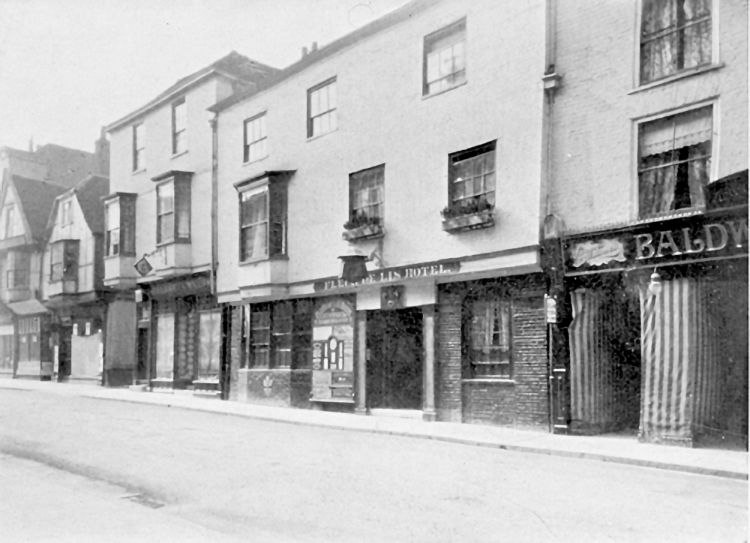
Above photo, 1905. |
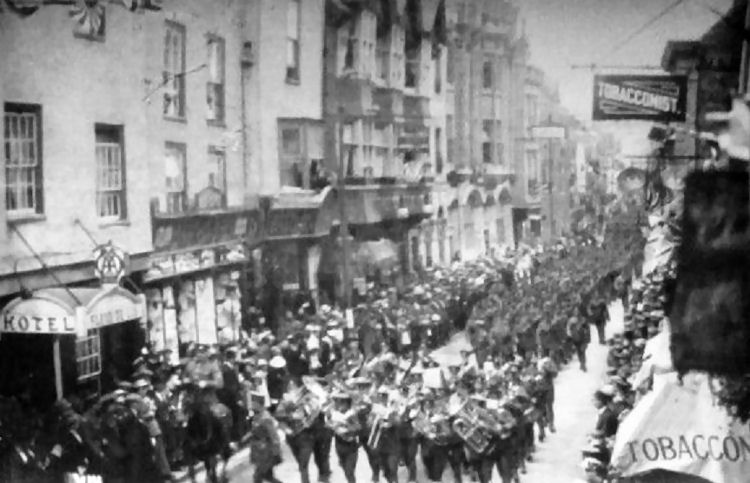
Above photo, circa 1915, kindly sent by Rory Kehoe. |
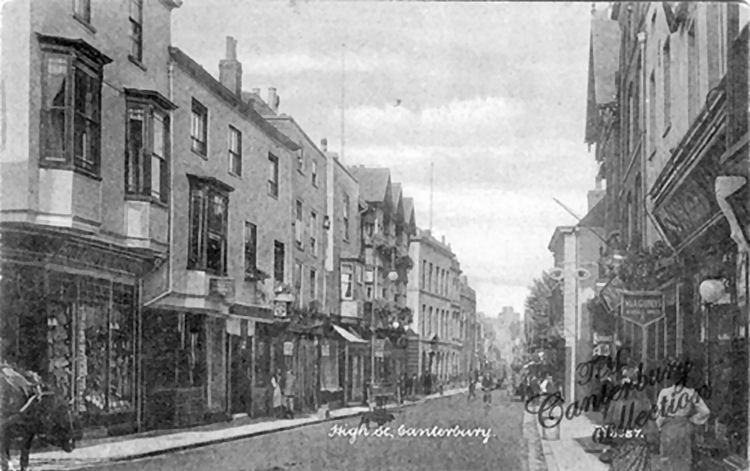
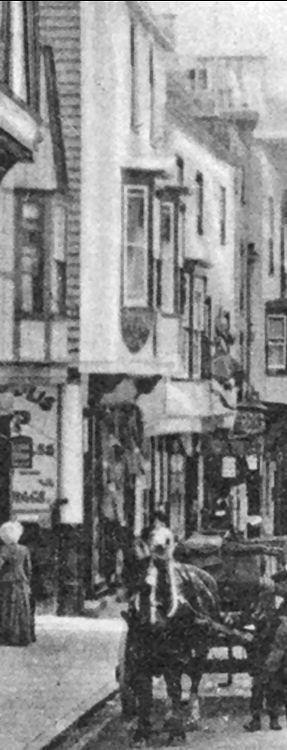
Above photos taken from the Historic Canterbury web site www.machadoink.com,
date unknown showing the "Fleur de Lis Inn" on the left.
|
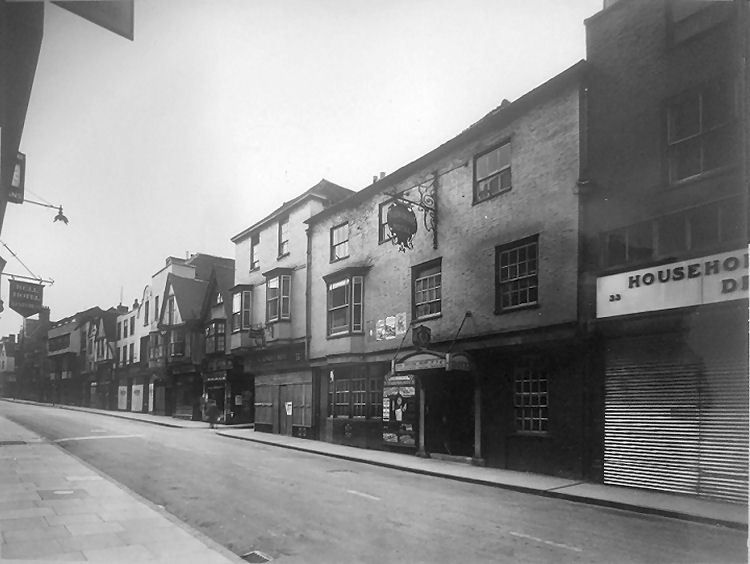
Above photo, circa 1946, kindly sent by Rory Kehoe. |
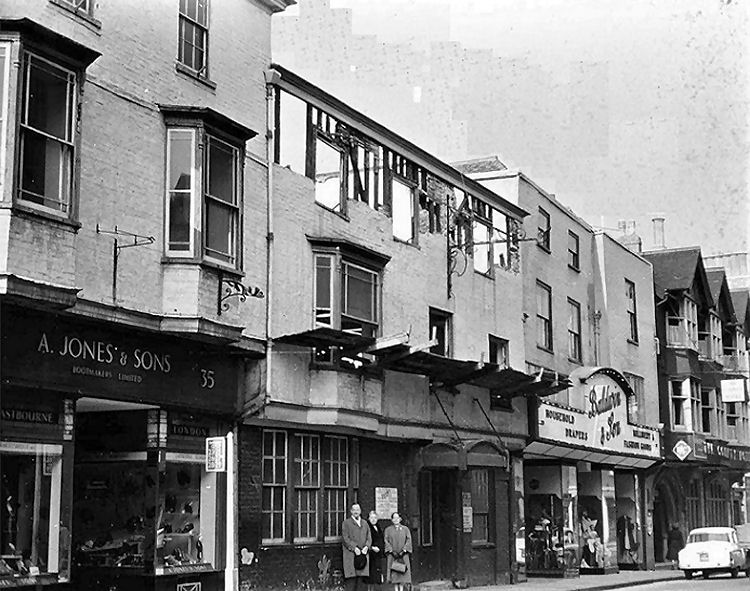
Above photo, 1958. Kindly sent by Rory Kehoe. |
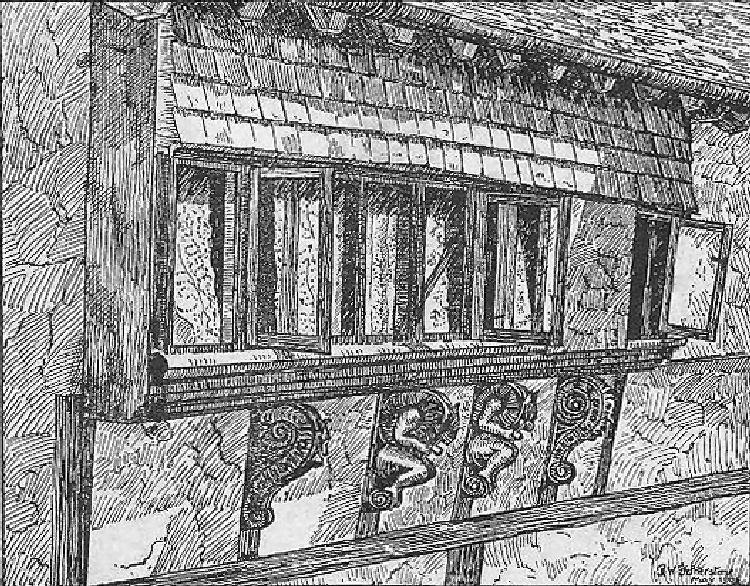
Above engraving 1808 showing the thirteenth century window in the
courtyard of the hotel. |
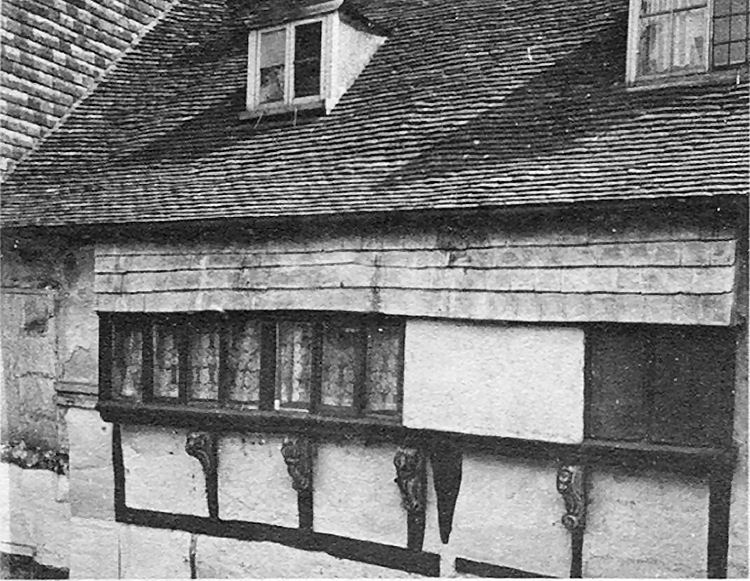
Above photo, circa 1895, kindly sent by Rory Kehoe. |
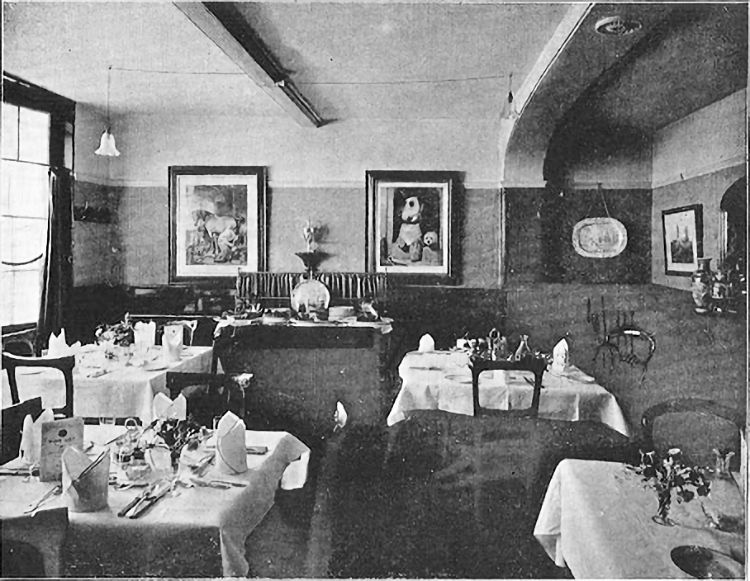
Above photo, showing the coffee room, date unknown. |
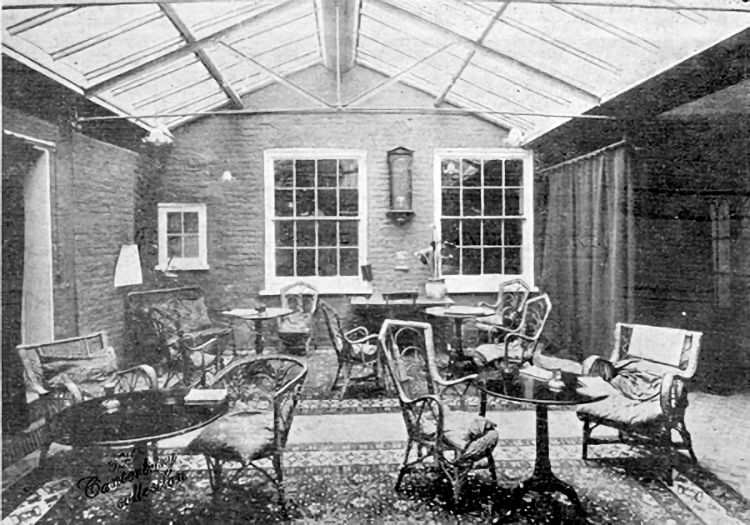
Above photo showing the lounge, date unknown. |
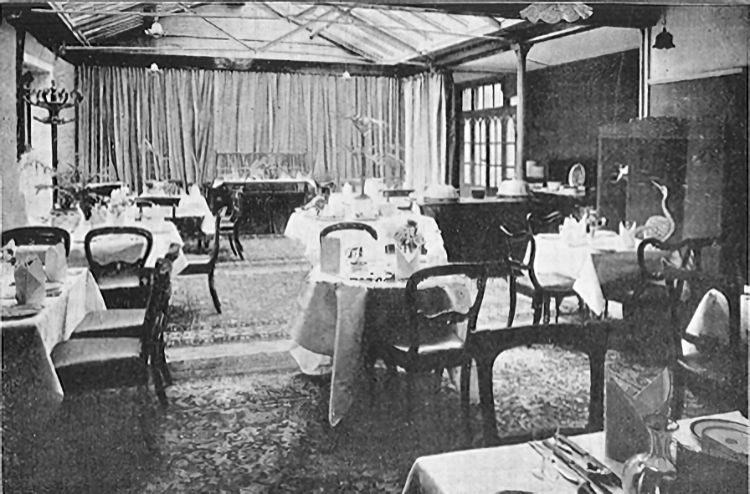
Above photo showing the Dining Room, date unknown. |
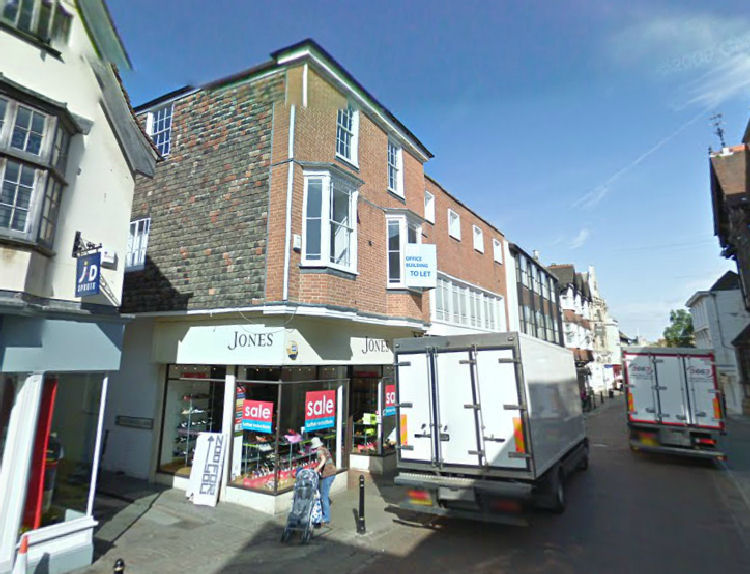
I believe the above picture taken from Google to be the same buildings
as shown above. |

Above photo, date unknown by Darkstar. |
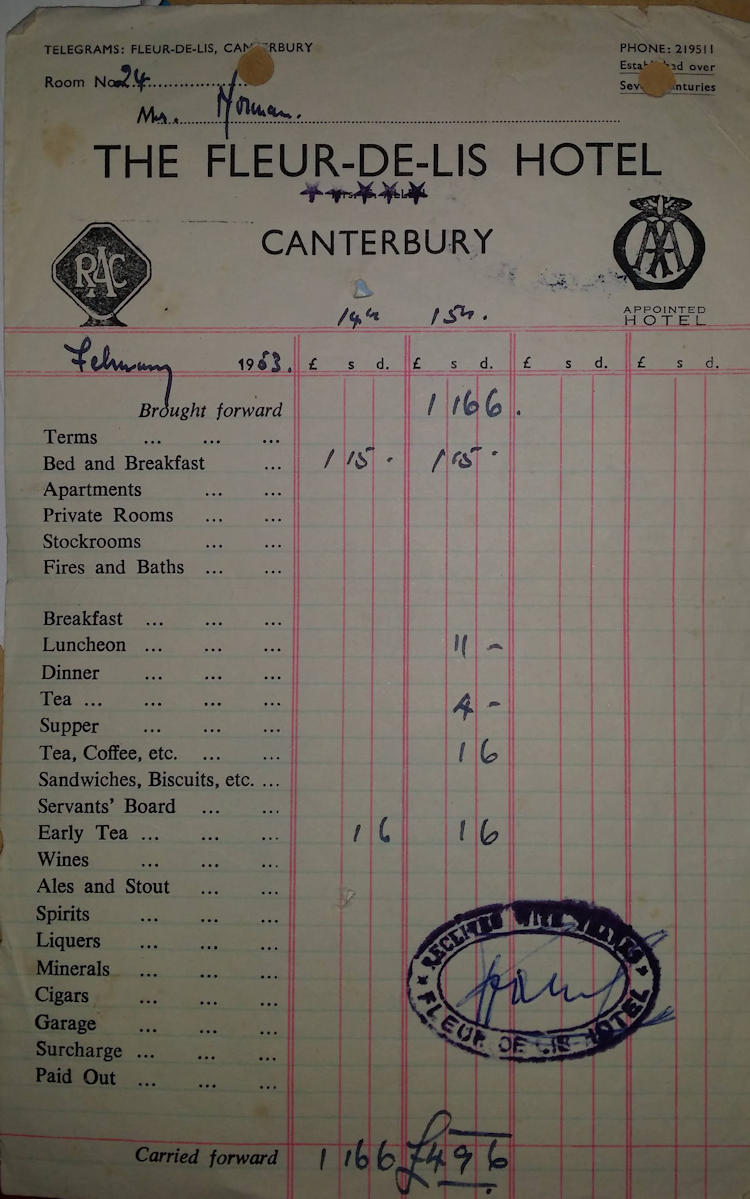
Above bill 1953, kindly sent by Mark Norman who says:- "Don't know if
it's of any interest but going through my late father's papers I found
this bill from Fleur De Lis Inn. It dates to my parent's honeymoon (they
were married on 14th Feb 1953). It gives you an idea of the kind of
facilities on offer (Servants' Board!)."
Cheers,
Mark Norman. |
Bygge, a baker by trade, was twice Mayor of Canterbury (1460 and 1466).
He had some interest in the "Fleur-de-Lis
Inn," and may have built some part of it. His bequest of £10 towards the
completion of St. George's Gate is noticed by Somner. His son John Bygge
(Mayor, 1472, 1473, and 1474), owned and enlarged Cogan House.
A slightly different pronunciation of the "Fleur de Luce" is shown below
from the Canterbury Gazette, but I'm pretty confident that this is referring
to the same house in the High Street. I do not know when the name "Flower de
Luce" became the "Fleur de Lis."
|
From the Kentish Gazette or Canterbury Chronicle,
Wednesday, 3 May, to Saturday 6 May, 1769. Price 2½d.
LEFT AT THE “FLOWER DE LUCE”
In the High Street, Canterbury, about Two Years ago, by a person
unknown.
A large Iron Crank, with other materials thereunto belonging. Any
person, describing the same, on paying the Charges and Advertisement,
may have it again, by applying to Bernard Eagleson as above.
N.B. If not owned, it will be Sold by Auction, on Monday next, between
Ten and Eleven o'clock in the Forenoon, as the said “Flower de Luce.”
|
|
Kentish Gazette, Tuesday 23 January 1770.
STOLEN.
From Mr. JAMES EYRE, out of a Carriage at the "Bull Inn" Yard, Sittingbourn, Five Cotton Counterpanes, Twenty-eight Yards of Crimson
Check, one Flanders and two common Bed-ticks, and two Pair of small
Blankets, and likewise the Door of the Carriage missing.
Whoever will give Information of the Person or Persons who stole the
above Goods, to Mr. Johnson, at the "Globe," Chatham; Mr. Eagleson, at
the "Flour de Luce," Canterbury; or at the "Bull" at Sittingbourn, so
that the above Mr. Eyre may have them again, shall receive One Guinea
Reward.
|
|
Kentish Chronicles, 14 March, 1794.
Tuesday night last some thieves stole from the "Fleur-de-Lis Inn,"
in this city, a basket containing 19 white aprons, 13 white
petticoats, 2 waistcoats, and a tablecloth, with which they got off
undiscovered.
|
|
Kentish Gazette 15 February 1803. Canterbury
Friday last Walter Stevens, John Weekes, and Ann Stevens, were fully
committed, for stealing a trunk from the "Fleur de Luce Inn," in
this city.
|
|
Kentish Gazette, 18 November, 1804.
DEATH.
Friday died, Mrs. Browne, of the "Fleur de Lis Inn" in this city.
|
|
Kent Gazette Reports 26 April 1805.
"FLEUR-DE-LIS INN," HIGH-STREET, CANTERBURY. (LATE BROWNE)
WILLIAM FRIEND begs leave to inform his Friends and the Public in
general, that he has taken the above INN, and assure; them his
endeavours to accommodate in every department of his business, for
the convenience and comfort of his customers, shall be such as to
entitle him to their favours, which will be most gratefully
acknowledged.
N. B. Wines and spirituous liquors of the best quality; good
stabling, hay, corn, &c.
An Ordinary every Saturday at one o’clock.
A COOK wanted.
|
|
Kentish Gazette, 28 October, 1806.
DEATH.
Friday, Mr. Friend, landlord of the "Fleur de Lis Inn," in this
City.
|
|
Kentish Gazette, 20 February, 1821.
MARRIED.
Feb. 15, at St. Mary Bredin church, Canterbury, Mr. Holmes, landlord
of the "Fleur-de-Lis," public-house, to Miss Elizabeth Weekes, of
Canterbury.
|
|
From the Kent Herald, 27 July 1826.
To Commercial Gentleman and the Public in General.
Fleur-de-Lis Inn and Commercial Hotel, High Street, Canterbury.
Toke James Simmonds, (late of the "Mermaid.") Respectfully announces to his
numerous Friends in the Commercial Department his Friends in Canterbury, and the
Public in General, that he has taken the above Inn, which has lately undergone
considerable improvement; and flatters himself, by the experience he has had in
the Public line, blended with assiduity to the comforts of his Friends, he can
compete with the any Establishment on the road.
In addressing his Commercial Friends T. J. S. can only assure them, that
gratitude for favours so liberally conferred on him at his late residence, will
be a sufficient stimulus to retain and deserve their future patronage.
Excellent Beds, Prime Old Wines and Spirits, and Good Stabling.
|
|
From the Kent Herald, 17 August 1826.
John Miller, "Globe Inn," High Street, Chatham. (Late of the "Fleur-de-Lys,"
Canterbury.)
Respectfully informs his Friends and the Public, that he has taken the "Globe
Inn," Chatham, and hopes by unremitting attention to share a continuance of that
patronage with which the "Globe Inn" has so long been favoured.
Good beds, Genuine Wines, Spirits, &c.
Chatham, August, 1826.
|
|
From the Kentish Gazette, 14 January 1834. Price 7d.
KENT AND CANTERBURY CATTLE SHOW.
THE Committee are requested to meet at the “Fleur-de-Lis Inn,”
Canterbury.
On SATURDAY the 18th day of January instant, at Eleven o'Clock
precisely, to appoint Stewards, &c. and arrange Premiums for the next
Show Day.
D. DENNE.
Honorary Secretary.
Herne, Jan. 11th 1834.
|
|
From the Kentish Gazette, 21 November 1837.
LOST.
ON THURSDAY EVENING, the 9th of November, 1837, between Harbledown and
Canterbury.
A DRIVING BOX,
containing a variety of Papers, of no value but to the owner. Any person
bringing the box, with its contents, to the "Fleur-de-Lis,"
Canterbury, shall receive One Pound Reward.
|
|
Canterbury Weekly, 9 December, 1837.
Police Report, Canterbury.
Thursday, Nov, 30.
Before the Mayor, and a full Bench of Magistrates.
John Sickamore was charged with having committed a violent assault
upon Henry Godsmark, at the "Fleur-de-Lis Inn," on the 27th ultimo.
Lieutenant Sicklemore apologised to the Bench for having omitted to
attend on Monday, and also on the preceding day.
The complainant stated that he was in the "Fleur-de-Lis Inn," on the
27th of November, at about half-past nine in the evening. Lieutenant
Sicklemore said I owe him a sovereign, and he would tell me I did so
before all the company. I said he might do so; I never made a bet
which I did not pay, if I lost it. He referred to Mr. Billiter, who
was in the room; and who said he did not remember anything of the
kind. Some of the company said that Lieutenant Sicklemore, "Why refer
to Mr. Billiter, if you will not abide by what he says?" Lieutenant
Sicklemore them raised his voice, and said, "You owe me a sovereign,
and you know you do!" I said, "If you say so, it is a b----y lie."
He then raised his stick, which was a heavy one, with a brass
ferule, and struck me on the head, which was cut open, and I fell
stunned; I became nearly insensible. Lieutenant Sicklemore then
pitched him into me, and I found nearly fell down. Mr. Saxby took
him away from me and I went out and got my head dressed.
Cross-examined by Mr. Sanke:- Think I was in the "leur-de-Lis" when
Lieutenant Sicklemore came in - some conversation had occurred
respecting the bet - would swear that I was stunned by the blow -
did return afterwards to play at cards - played two or three rubbers
- has been no bad feeling between Lieutenant Sicklemore - does not
know what Mr. Bonburry has sold some horses in consequence of
Lieutenant Sicklemore riding them - did not know that Lieutenant
Sicklemore was a horse dealer - has had some conversation with Mr.
Hyder, but he did not recommend me to prosecute.
Mr. Henry Billiter was at the "Fleur-de-Lis" on the evening referred
to, and saw complainant and defendant their. Some altercation took
place respecting a bet, and Lieutenant Sicklemore charged Mr.
Godsmark with having made a bet which he refused to pay. Mr.
Godsmark replied, "You are a b----y liar!" The blow was then given
with a stick, it was a very awkward blow; and the parties then got
together; they seem to be "cuddling" each other - they "hustled"
together.
Cross-examined by Mr. Sankey:- Does not think Lieutenant Sicklemore
of a quarrelsome deposition - did not see any blow struck by
Godsmark in return. When Godsmark returned he called Lieutenant
Sicklemore a coward for striking him when he was unarmed.
Mr. Sankey in defence, said he was somewhat relieved from a feeling
of apprehension which he had entertained on behalf of his client. He
had heard that a most unprovoked and violent assaults had been
committed on Mr. Godsmark. He admitted the assault of being
committed, but the provocation was so great that no gentleman could
resist the impulse of indignation, when such language was applied to
him, as that used by Mr. Godsmark.
Mr. Baker, clerk to Mr. Delasaux, prayed the Magistrates to refer
the case to the sessions. As to the provocation referred to by Mr.
Sankey, it was first given by the defendant; although the language
used by Mr. Godsmark was, he admitted, somewhat gross, it was by no
means the justification of the assault.
Mr. Sankey hoped the Magistrates with exercise the salutary power
with which they were vested by the Legislature, and by a summary
conviction put an end to the the litigation.
The Mayor, after consultation with the Magistrates stated that they
were of opinion that the best course for them to take would be to
leave the complainant to his remedy at the Sessions, and bound the
defendant to appear at the next Sessions, himself in £20, and two
sureties of £10, and in the meantime to keep the peace towards the
compliment and all her Majesty's subjects.
Mr. Edward Greenwood and Mr. Edward Saxby became found for the
defendant's appearance.
Kentish Chronicle.
|
|
Kentish Gazette, 14 May 1844.
KENT AND CANTERBURY CATTLE SHOW, and Society for Rewarding Laborers and
Servants in East Kent.
A MEETING of the COMMITTEE of this Society will he holden at the "Fleur
de Lis Inn," CANTERBURY, on SATURDAY, the 18th day of MAY instant, at
Eleven o'clock precisely, when the attendance of any Subscriber will be
esteemed a favour.
JOHN CHARLES ABBOTT, Hon, Sec. Canterbury, May 13, 1844.
|
|
From the Kentish Gazette, 14 April 1846.
CANTERBURY QUARTER SESSION.
On Thursday last the Quarter Session for the City of Canterbury was held
at the Guildhall, before J. Deedes, Esq., recorder. The mayor and other
magistrates were also in the bench.
The following were sworn the graud jury:— Messrs. Chas. Mason (foreman),
G. Ash, H. West, G. Castleden, H. Bird, R. Foord, Wm. Paine, G. Smith,
F. Bellingham, R. Lee, Chas. Hudson, J. Brooks, E. Keeler, Thos. Pratt,
Wm. Collard, G. Harrison, T. Moore, G. Claris, T. Mose, W. Green.
CALENDAR OF THE PRISONERS.
Thomas Reynolds, Richard Hunt, and Cornelius Sans, who were at large on
their recognisances, were arranged on a charge of taking from the
person of Joseph Hogg nine bank notes, each value £5.
Mr. Lushington appeared for the prosecution; and Messrs. Espinasse and
Rose for the defence of Sans, and Messrs. Horn and Russell for Hunt and
Reynolds.
The case occupied upwards of six hours, during which the hall was much
thronged. The prosecutor swore, that on the 3d of March last he had left
Harbledown for Canterbury, with money in his possession to the amount of
£226 in cash and a bank receipt of £100; that he deposited £100 in the
Canterbury old bank; and that he went to the "Mermaid Inn," where he
lost about £5 at cards. At a late hour in the evening he went to Clark’s
billiard room, where he met the accused and others. He here played, and
lost money to the amount of about £45; and in the morning the four
parties adjourned to the "Fleur de Lis," where, having breakfasted, they
sat down to cards, and the prosecutor lost the remainder of his money
with the exception of £25. He obtained loans from Reynolds upon one of
his bank receipts to the amount of £70, and going to the bank, received
his money for the other, at the same time requesting that if he had
parted from was presented, it should not be paid. He returned again to
the party, and resuming play, lost £55 more. The remainder of the £100
he he placed in his great coat side pocket, and Reynolds, who had
previously to his doing so left the room shortly afterwards returned,
and charged him with having stopped the payment of the note upon which
he had advanced him money. He said that on this announcement the two
others rose, and he was surrounded by them, and Reynolds pushed him
about. Immediately afterwards he missed his money, and on asking the
defendants for it, they disclaimed, all knowledge of it. He looked round
the room for the notes, but could not find them. He called for the
waiter, but was prevented from going to the door. At length he rung the
bell, and the door, which had been previously fastened, was unlocked,
and the waiter entered. He desired him to fetch a policeman, and turned
out his pocket to show he had been robbed.
The prosecutor was cross examined at considerable length, and into the
habits of his previous life, from which it appeared that he had carried
on business at various towns in Kent as a linen-draper, for a short
period at each; that he had failed in some of these speculations. His
mother had advanced him money to embark in business; but he would not
tell where she lived, or where his father resided. He said he had not
told the accused parties that his father had been mayor of Lynn, in
Norfolk, nor that he had himself lost £2000 on coming of age. Mr.
Musselbrook, of Harbledown, had advanced him money to purchase stock for
some of his establishments. It was his own business whether he was
paying his addresses to Musselbrook's daughter. He had never played at
cards at any other place than Canterbury, and then it was sometimes for
money and sometimes for I.O.U's. One of the I.O.U's he had given he had
not paid. Others had refused to pay him on theirs. The money he had
thus lost was advanced to him to open business. The examination then
turned to the circumstance of the indictment. He could not say who
ordered the cards, but he did not. He did not hear Reynolds desire the
waiter to fetch a policeman before he had spoken himself. He
(prosecutor) first demanded the presence of the police. After he said he
had been robbed, Reynolds told the waiter to fetch Clements (the
superintendent). The waiter did not bring one, and he went himself to
find one. He did not go in the direction of the station-house, but the
opposite way, having heard that a policeman had passed. This affair took
place on Tuesday, and he informed the police of it on Thursday, having
in the meantime gone to London. He lost about £45 at billiards to Sans,
who, on his telling him he had lost all of his own money, forgave him
£10, which he had lost in addition to this sum. He had not proposed to
compromise the matter, but had two offers made him to do so for £100.
£200 of the money he had on this occasion was Mr. Musselbrook’s. He had
never stated to the contrary.
The prosecutor underwent another severe cross-examination from Mr.
Horne, respecting some I.O.U.'s lost in gambling transactions. When the
waiter went into the room, Reynolds did say, "This young man says he has
been robbed by us. We have not robbed him."
On re-examination, he said—Sans had wished to compromise the matter.
John Goulden, waiter at the "Fleur de Lis" called:— He went into the
room when the bell rang, and Mr. Reynold's said the prosecutor had
charged them with robbing him, and he must fetch a policeman. Prosecutor
then told him to go for one. The door was not fastened, nor had he heard
any noise. Had been into the room six or seven times during the play.
Saw bank notes on the table, and heard no dispute. Did not go for a
policeman.
Mr. Espinasse, in addressing the Jury for Sans, observed that very
little or no ground existed for believing the prosecutor's statement.
The charge altogether was one of the greatest improbability. Not the
slightest proof of theft had been proved against any of them. Although he
had been pushed about he had not ventured to say that his pocket had
been touched. The learned counsel then alluded to the unsatisfactory
nature of the evidence given by the prosecutor on the other points
touching his credibility, and concluded by expressing his confidence
that all the persons would be acquitted, for against them the charge had
in no way whatever been substantiated.
Mr. Horne followed for the other two, reviewing the circumstances of the
case, and said if persons were to be convicted upon such testimony as
they had heard that day, no man would be safe. He felt that the
defendants were innocent, and that they would certainly obtain a full
acquittal.
Witnesses to character having been heard, the learned Recorder, in
summing up, carefully recapitulated the evidence, remarking on the
improbability of many of the prosecutors statements, the fact of the
prosecutor's disowning his parentage, and many other circumstances
equally tainted with suspicion—his making an assignment in one case to
parties he knew not the name of—the manner of his general dealing for
many months, in obtaining goods that he did not give a satisfactory
account of, and disposing of them by opening shops at various places.
The learned Recorder continued, that there did not appear any evidence
or any charge on the part of prosecutor that there was any unfair
play—they had a right to consider what was won was fairly won; and it
appeared most unlikely that a person should borrow money and draw £100
of the bank whilst he had in his possession £25, as sworn by the
prosecutor. The jury had to consider these points, and to weigh the very
excellent character which the parties had received in contradistinction
to the prosecutor Hogg, who did not appear before them certainly in the
most favourable light.
The jury instantly acquitted the prisoners.
|
|
Kentish Gazette, 16 March 1847.
HERNE, HUNT.
THE Friends of the above Hunt, have invited Edward Collard, Esq. as
Master of the Hounds, to dine with them at the "Fleur de Lis,"
CANTERBURY, on THURSDAY, the 25th day of MARCH instant. Those gentlemen
that are favourable, and wishing to attend, are requested to take
Tickets on or before Tuesday, the 23d Instant, at the "Fleur de Lis"
Hotel.
Dinner on Table punctually at Four o'clock.
|
|
From the Kentish Gazette, 1 February 1848.
SIMMONDS.
January 29th, at the "Fleur de Lis," Canterbury, universally respected
and regretted, Mr. Toke Jams Simmonds, aged 67. He was a most tender and
affectionate husband, a kind parent, and true-hearted friend. His many
many admirable qualities, honorable feeling, and strict probity,
endeared him to a very numerous circle of friends and acquaintance, by
whom he will long be remembered with esteem and regret. His end was
peace.
The deceased had held the situation of Lieutenant of Sandgate Castle for
many years.
|
|
From the Kentish Gazette, 25 April 1848.
FLEUR DE LIS & COMMERCIAL HOTEL, CANTERBURY.
JANE SIMMONDS returns thanks for the favours conferred on her late
husband, and begs to inform the
Commercial Gentlemen and her friends in general, that she intends to
CARRY ON THE BUSINESS, and
trusts by the strictest attention to merit their future support and
patronage.
April 17,1848.
|
|
Southeastern Gazette, 16 August 1853.
County Court.
This court was hold in the Guildhall, before Charles Harwood, Esq.,
on Friday last.
Simmonds v. Bushell.
This was a case involving a principle of some importance to the
trading community. It was an action for the recovery of £50 lent by
the plaintiff, the landlord of the "Fleur-de-lis Inn," in this city,
to the defendant, a corn-factor, also living in Canterbury. Although
a considerable time was occupied in hearing the case, the facts
themselves were very simple, and may be briefly stated.
In July, 1850, the defendant was at a rent dinner at the plaintiffs
house, on which occasion he borrowed the £50 in question, and gave
him a cheque for the amount on the London and County Bank at
Sandwich. Such was the defendant’s statement, but the plaintiff
denied ever having had any cheque. Shortly after the transaction,
the defendant called upon the plaintiff, and requested him to
receive the £50 of a Mr. Pollock, who then held £600 belonging to
him. Plaintiff did not object, as he said it was immaterial to him
from whom he had the money. About two years afterwards, the
defendant became an insolvent, but considering that the £50 had been
paid to the plaintiff, as defendant had allowed it in the account
with Mr. Pollock, the name of the plaintiff was not inserted in the
schedule upon which he had passed the court at Sandwich. No
application was made for payment until the present year, Mr. Pollock
having in the interim left the county. It was proved that the cheque
(if there was one) would have been honoured at that time by the
Sandwich bank, where the defendant did business; and it was also
elicited from the plaintiff that the reason he had not pressed or
applied to the defendant earlier for payment, was because he did not
wish to injure him in his business. After carefully reviewing the
case, his Honour gave judgment for the plaintiff, to be paid in
monthly instalments of £5. Mr. Sandy's was for the defendant and Mr.
Delasaux for plaintiff.
|
|
Faversham Gazette, 5 January 1856.
COUNTY PETTY SESSIONS.
[Present: Rev. J. Poore, D.D., Edward Jarman, Esq., Major Munn, F.
C. Hyde, Esq., and E. H. K. Hugesson.
W. Toke Simmons, the landlord of the "Fleur-de-Lis" inn. at
Canterbury, was summoned for riding on the footpath at Boughton-hill.
The defendant did not appear, and the offence being proved, he was
fined £2 and costs.
|
|
South Eastern Gazette. Tuesday 8 January 1856.
Mr. Toke Simmonds, landlord of the "Fleur de Lis," at Canterbury, was
summoned for riding on the footpath at Boughton Hill. The defendant did
not appear, and the offence being proved he was fined £2 and costs.
|
|
Faversham Gazette, 29 November, 1856.
DEATH.
Nov. 26, at Canterbury, Mr. Toke Simmonds, of the "Fleur-de-Lis
Inn."
|
|
South Eastern Gazette, 28 August, 1860.
Charge of Felony, and Apology.
On Thursday last Geo. Ginnett (a rider at the circus now travelling
this district, and brother to the proprietor) was charged with
stealing a pair of bracelets from the wife of a commercial traveller
staying at the "Fleur-de-Lis Inn," High-street. It appeared that the
owner of the bracelets had been to the cathedral and to other parts
of the city, and while looking into the window of one of the shops,
she missed her bracelets. Seeing the accused (who is about 17 or 18
years of age) standing by her side, she inquired if he had seen
them? He replied in the negative. The female (whose name did not
transfer) then passed down the street, and meeting her husband,
communicated her loss, and her suspicion that Ginnett had taken
them. He was therefore given into the custody of Inspector Dodd, and
searched, but the missing bracelets were nowhere to be found. The
bench discharged the accused, the Mayor observing that he left the
court without the slightest stain upon his character. Afterwards Mr.
Ginnett went to the "Fleur-de-Lis" and demanded an apology from the
parties. This was readily given, and regret expressed that the young
man should have been suspected of such an offence.
|
|
From the Kentish Chronicle, 6 February, 1864.
TRADESMEN’S DINNER.
Between 20 and 30 citizens of Canterbury, sat down to a very excellent
dinner, at the “Fleur-de-Lis Hotel,” on Tuesday. Mr. Hugman was in the
chair, and, like Yorick of old, “kept the table in a roar” with his fund
of anecdote and good-humoured sallies, indeed he may be said to have
sustained the evening’s entertainment, with the relief of half-a dozen
songs at intervals. The host (Mr. Z. Prentice) was highly and deservedly
complimented for the admirable manner in which he catered for his
guests.
|
|
Whitstable Times and Herne Bay Herald, 28 May 1870.
PRESENTATION OF A TESTIMONIAL TO THE CORONER FOR KENT, T. T. DELASAUX, ESQ.
This pleasing ceremony took place at the "Fleur de Lis Hotel,"
Canterbury, on Tuesday afternoon. Since the idea of presenting the
Coroner with a testimonial on the completion of his 50th year of office
was first started, subscriptions from all parts of the county have
freely come in. Although such a step was hinted at some months ago, it
has only been within the last three or four weeks that any definite
action has been taken. In that time a large sum was subscribed with
which were purchased a handsome tea and coffee set, a case of fish
knives and forks with carvers, some spoons and forks, and a massive
salver, all in silver. The articles were purchased of Messrs. Trimnell
and of Messrs. Mason, and are worthy of the repute in which those
establishments are held.
The company assembled at one o’clock, and included T. S. Cooper, Esq.,
who has acted throughout as a most efficient chairman of the committee,
the Mayor of Canterbury, the Sheriff, the Deputy Coroner, Mr. Walter
Furley, Mr. G. P. Collard. Mr. G. Beer, Mr. Hutchings, Mr. B. Tassell,
Mr. Morgan, Mr. G. Collard, Mr. Ratcliff, Mr. Trimnell, Mr. Davey, Mr.
Sendell, Mr. Mason, Mr. Sprague, &c., &c. Other subscribers to the
testimonial who were invited were unavoidably absent.
The company first inspected the testimonial, and here we should state
that the salver bore the following inscription:—
"Presented to Thomas Thorpe Delasaux, Esq., in testimony of the
efficient manner in which he has discharged the duties of Coroner for
Kent during a period of fifty years. April 20th, 1870."
The actual business of presentation occupied but a very short time,
inasmuch as the earnest and punctual chairman of the Committee, Mr. T.
S. Cooper, with his usual precision, commenced the proceedings precisely
at the hour fixed (one o’clock) by stepping forward and saying:— It is my
pleasing duty to present you, Mr. Coroner Delasaux, on behalf of the
subscribers, this service of plate, and to beg your acceptance of it,
accompanied with their sincere desire that you may long live, not only
to enjoy the pleasurable associations connected with the gift, but
continue to command that esteem and regard which you now so deservedly
possess, and which we have chosen to exhibit towards you by begging your
acceptance of the silver plate now before you.
Mr. Delasaux (who spoke with emotion) said: When I look back at the
origin of the contest which placed me in the position I at present
occupy, and which has enabled me to be the proud recipient of your
kindness to-day, I do so with mingled feelings of pleasure and regret;
with pleasure because it reminds me of the many friends I had in my
youthful days, and with regret because out of the 776 freeholders in
Kent who voted for me on that occasion there are only three alive, and
one of that number had attained the age of 91 years. The duties of the
office of coroner are, as you all must so aware, of a difficult
character, but it is a satisfaction to me to know that during the long
period in which I have held the appointment I have never been complained
against, nor has a single verdict which I have directed been upset.
Gentlemen, to say that I am thankful for your exceeding kindness in
making me this handsome present would too inadequately express my
feelings; I am grateful, for who could entertain feelings less than
those of gratitude at having the kindness and good feeling of friends so
handsomely recorded. The gift is doubly gratifying to me; for not only
do I value it as a testimony of esteem on the part of my many friends,
and as such shall cherish it, but shall hand it down as a memento of
valued and sincere friendship. With regard to my chairman I am sure I
cannot sufficiently thank him for the kind part he has taken in this
matter. He is at all times willing to assist in a work of kindness, and
to him and to you all I beg again to tender my very sincere and grateful
thanks.
Mr. Cooper then made the announcement that the Coroner wished the
company to join him at luncheon whereupon they retired to another room
and partook of a splendid old collation provided by Mr. Prentis.
The health of the Queen and wishing her many happy returns of the day on
the anniversary of her birth was submitted by the chairman (Mr. Cooper)
in really good taste, and after several other toasts had been given and
acknowledged the interesting proceedings terminated.
|
|
From the Whitstable Times, 7 June, 1902.
SALE OF THE “FLEUR DE LIS” HOTEL.
At the Auction Mart, St. Margaret’s Street, on Saturday afternoon,
Messrs. Kennett and Chamberlain, in conjunction with Mr. Matthew Miles,
offered for sale the “Fleur de Lis Hotel” in the High Street,
Canterbury, together with the business premises adjoining, and the "Hotel
Tap" in White Horse Lane. There was a large attendance, and considerable
interest appeared to be evinced in the sale. Eventually the whole
property was disposed of for £4,000, the purchaser being Sir. Sanderson,
of Ealing. It is stated that some time ago as much as £8,000 could have
been had for the property. The solicitors for the vendors were Messrs. Wightwick and Kingsford, Canterbury.
|
|
From the Whitstable Times, 12 July, 1902.
THE FLEUR DE LIS HOTEL.
Mr. William Ashenden applied on behalf of Mr. Frederick Finn and himself
as executors of the late Mr. Horatio Ward, that the licence of the
“Fleur de Lis Hotel” might, he transferred to Mr. Charles Sanderson, the
new proprietor. The Magistrates granted a temporary authority until the next transfer
day in August. |
In 1889 the "Fleur de Lis " was advertising the fact they had billiard
rooms situated at number 35.
I am also informed by Peter Nunn that this was the watering hole for
spitfire squadron 92 - "our favourite hostelry" - when based in Kent in 1941
(Manston).
Fleur de Lis was one of the oldest hotels, established over 700 years
ago. It was located on 34 High Street, Canterbury, Kent, England.
Fleur-de-lis means lily (in French, fleur and lis mean 'flower' and 'lily'
respectively) that is used as a decorative design or symbol.
Parts of the building date back to the 13th century. It is recorded that
Charles Dickens stayed there and took his meals in the coffee room
overlooking High Street.
As a hotel, the Fleur de Lis Hotel had single and double bedrooms, and a
bar and restaurant that served breakfast, lunch, afternoon tea, and dinner.
It was advertised as close to a cathedral, railway stations, and a general
post office.

1895 photograph shows the windows and carved corbels in the courtyard of
Fleur de Lis Hotel.
The hotel is mentioned as early as 1376. In the back of the building was a
livery stable and the Fleur de Lis tap, which can be dated to 1372. An
engraving from 1808 on a post card shows the 13th century windows in the
courtyard of the hotel with carved corbels. The same corbels can be seen in
a 1895 photograph that show the back of the building next to The Cherry Tree Freehouse
pub on 10 White Horse Lane.
Thomas Paramore, Esquire of Monkton, Kent said in his will of 1637, that he
gave his dwelling called "the Fleur de luce in Canterbury, to his nephew
Thomas Paramore, on condition that he paid to the mayor and aldermen 100
pounds and the same to be lent to five poor shopkeepers of the city."
The 1824 city directory said:- One of the oldest of the City hostelries,
which was an Inn in the early years of the fifteenth century. Lately
renovated throughout in accordance with modern requirements, the interior
still retains much of the old-world character for which it was noted when
Charles Dickens used to stay here as a guest. From the Courtyard, now
converted into a lounge, may still be seen an early thirteenth century
window, unspoiled by restoration, while a portion of the Tudor staircase yet
remains."
On September 14, 1872, the Mayor's annual banquet was held at the Fleur de
Lis Hotel, by the landlord Samuel Prentice. The room was decorated with
flowers and plants that were supplied by the Earl of Mountcharles, Captain
Lambert, and Mr. Mount. Those that were in attendance were the aldermen and
councilors, including Canterbury Mayor George Furley.
In the 20-century, the hotel was used for various functions including
city elections and for local society meetings. In 1906, postcards show
photographs of the hotel's Coffee Room, lounge, and dining room. On
September 8, 1910, Ben Twyman sold the hotel and several lots. At that time,
there was still a livery stable in the back and the Fleur de Lis tap.
The hotel was demolished in 1958. The three-story building that replaced
it has two retail stores. Today, the Fleur de Lis tap is the home of the
"Cherry Tree" Freehouse pub at 10 White Horse Lane.
LICENSEE LIST
BROWN ???? Mr to 1804-Mar/1805
FRIEND William Mar/1805-Oct/06 dec'd
HOLMES Mr 1821+
EAGLESON Mr ????
MILLER John 1824-July/26

  
 SIMMONDS Toke James (John) July/1826-Feb/48 dec'd
SIMMONDS Toke James (John) July/1826-Feb/48 dec'd
     (age 55 in 1841
(age 55 in 1841 ) )
SIMMONDS Jane Feb/1848-58+ (widow age 77 in 1851 ) )

SIMMONDS Louisa J 1861-62+ (widow age 44 in 1861 ) )

SIMMONDS Jane & PRENTICE Zachariah 1863-64+
 
PRENTICE Zachariah 1867-71+ (age 35 in 1871 ) )

PRENTICE Samuel 1874+

TEMPLE Charlotte A 1881+
 (manageress hotel age 33 in 1881
(manageress hotel age 33 in 1881 ) )
 WARD Horatio 1889-July/02
WARD Horatio 1889-July/02
 
SANDERSON Charles July/1902-03+
 (proprietor)
(proprietor)
SHEPPARD M 1917+

https://pubwiki.co.uk/FleurdeLis.shtml
http://www.closedpubs.co.uk/fleurdelys.html
 From the Pigot's Directory 1824 From the Pigot's Directory 1824
 From the Pigot's Directory 1828-29 From the Pigot's Directory 1828-29
 From the Pigot's Directory 1832-33-34 From the Pigot's Directory 1832-33-34
 Stapleton's
Guide 1838 Stapleton's
Guide 1838
 From the Pigot's Directory 1840 From the Pigot's Directory 1840
 From Melville's Directory 1858 From Melville's Directory 1858
 From the Post Office Directory 1862 From the Post Office Directory 1862
 Greens
Canterbury Directory 1868 Greens
Canterbury Directory 1868
 From the Post Office Directory 1874 From the Post Office Directory 1874
 Census Census
 From the Post Office Directory 1891 From the Post Office Directory 1891
 Historic
Canterbury web site www.machadoink.com Historic
Canterbury web site www.machadoink.com
 Kentish
Chronicle Kentish
Chronicle
|














